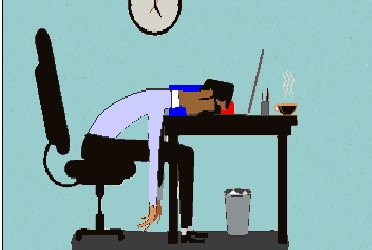Imagine for a minute; you get to the pearly gates of heaven, you are warmly received by the Angel at the entrance with a simple question. “Where will you like to spend eternity?”Your answer: “Heaven of course!” The Angel says to you: “Please check out hell first before you decide.” Surprisingly and reluctantly you go to check up hell; the elevator doors open and you see incredible beaches, big cinemas, golf courses, gorgeous people eating sumptuous food. Everyone is enjoying and having fun, it is an incredible sight. You are surprised; you rationalise real quick; that heaven will be better. You then take the elevator to heaven’s gate; you see a bunch of dull harp-playing people, nothing fun. The food does not look as great as the ones you saw in hell. You return to the angel: “I didn’t think I’d ever say this, but I think I’d rather go to hell,” you say. “So shall it be,” he says, and you head back down to start your new afterlife. When you get to hell this time, fire and brimstone greets you. You exclaim “Where are the great food and incredible atmosphere?” Your welcoming committee stares at you blankly: “Oh,” they say, “Yesterday we were recruiting you. Today you’re staffed.” Sometimes, this may define employees’ experience after recruitment and on-boarding programmes. In today’s article, I look at how poorly managed employees experience affect customer experience and organisational performance. “Always treat your employees exactly as you want them to treat your best customers” — Stephen Covey. Poor customer service is a common phenomenon in almost every industry in Nigeria; vendors rudely respond to customers, many others are clueless as to what the customer wants. The first rule in customer service sometimes seems to be non-existent, i.e. # rule 101 “be polite and friendly to your customers no matter how they behave”. When you walk into a store for the first time, they greet you politely with a smile (“the cosmetic hell”). If you stay too long without buying anything, their countenance will change (“welcome to real hell”). If you negotiate the price beyond their expectation then you will incur their wrath. if you then move to touch and feel their goods, they go swiftly, from politeness to insulting, smiling to frowning, and joy to anger. In telecoms, the customer care agent is very likely to speak to you in a condescending manner; at the medical centres, the nurses are likely to talk to you rudely; in the banking sector, the attendant is expected to ignore a long queue of customers to attend to the man with the fat bag, without apologies. Round Pegs in Square Holes Wrong hire, poor vision casting program, celebrating customers at the expense of employees sometimes bring the unspoken war in the mind of the employee, who feels the need to be treated better. Many employers make a big fuss about managing the customer right, but they do not treat their employees right. In a bid to make “customer” the king, employers make the strategic error of neglecting their employees, this is counter-intuitive because happy employees make happy customers. Employees Engagement: Need for a Paradigm Shift Employees are not just the greatest asset of an organisation but should also be seen as the organisation’s first customers. They control a specific segment of the market where they intentionally or inadvertently market or demarket your organisation. It is instructive, therefore, that employees are indeed the first customer of any organisation and customers are kings. Any organisation with mediocre, ill-equipped and poorly motivated employees cannot achieve excellent customer service. Gordon M. Bethune became the CEO of Continental Airlines in 1994. Before that time the airline was on the brink of bankruptcy. He transformed the airline, and within the first two years the share price moved from $2 to $50! In an interview with New York Times years later, Gordon revealed his secret:
-
Employees had access to him directly.
-
Every week he informed employees of the performance of the company and the industry for 10 straight years.
-
Gordon made leadership personal when an employee was underperforming; he made it a responsibility to ask such an employee — “How can we help you do your job better?”
Unfortunately, all leaders are not Gordon. A survey published by Forbes shows that 65% of employees in a sample population were willing to forego a pay raise if it meant seeing their leader fired!

Why do Employees Fail in Customer Service?
-
Lack of capacity development: employees cannot give what they don’t have. Training must be constant and many organisation spend little on it, and if they are looking for a cost-cutting measure the first place to touch is the employee’s induced cost. What a wrong strategy? An empowered and enlightened employee is better to deliver on brand promise than an ill-equipped and unmotivated employee.
-
Treating them like lemons: don’t squeeze the juice out of them to make lemonade. If they sense that they’re just being used, they will refuse to give optimal performance.
-
Responsibility without authority: failure to empower them with authority to carry out their responsibilities will make them largely ineffective, reactionary.
-
Failure to give them backings: they deserve the respect needed to make them perform at their best. Employees’ and customers’ interest should be complimentary.
-
Lack of strategic inclusion: employees must be appropriately involved in the strategic development process. One of the reasons why I am a huge fan of the Design Thinking concept is that it gives a voice to a cross-functional team to develop ideas from a human-centred perspective.
-
Failure to constantly promote Service Philosophy: they need to be constantly trained and reminded about your service delivery philosophy and value proposition.
-
Segregating Customer relations function: business development is everybody’s responsibility, the idea of identifying some category of staff as the frontline customer service officer may be counterproductive. All employees from the Security at the gate to the Janitor should see themselves as a part of the customer service framework. Therefore, the reward system should be so developed.
There are huge gaps and untapped capacity development program in customer service and except business owners takes this very seriously, the idea of achieving transformational growth will be a mirage. Wal-Mart is the world largest company by revenue and the largest private employer of labour with about 2.3million employees. The company which started in 1962 now has $485billion in revenue and 11,718 stores in 28 countries! Sam Watson, the founder, is famous for one saying: “There is only one boss. The customer. Moreover, he can fire everybody in the company from the Chairman on down, simply by spending his money somewhere else.” This statement is partially true today especially as millennials are taking over the workforce. They demand more than just the paycheck — they want value, purpose and engagement. Every business leader must recognise this and create an environment that empowers their employees; this will directly impact the bottom line. The Way Forward If the customer is King, then the employee must be seen and treated as the Kingmakers. There should not be a contest between employees’ interest and that of the customer. Failure to faithfully meet the employee’s interest puts that of the customer in jeopardy.

Olukunle A. Iyanda PhD, FCA, SNFLI.
Founder/CEO, BROOT Consulting Nigeria Limited.
Human-Centric Design Led Innovation Consultant.




